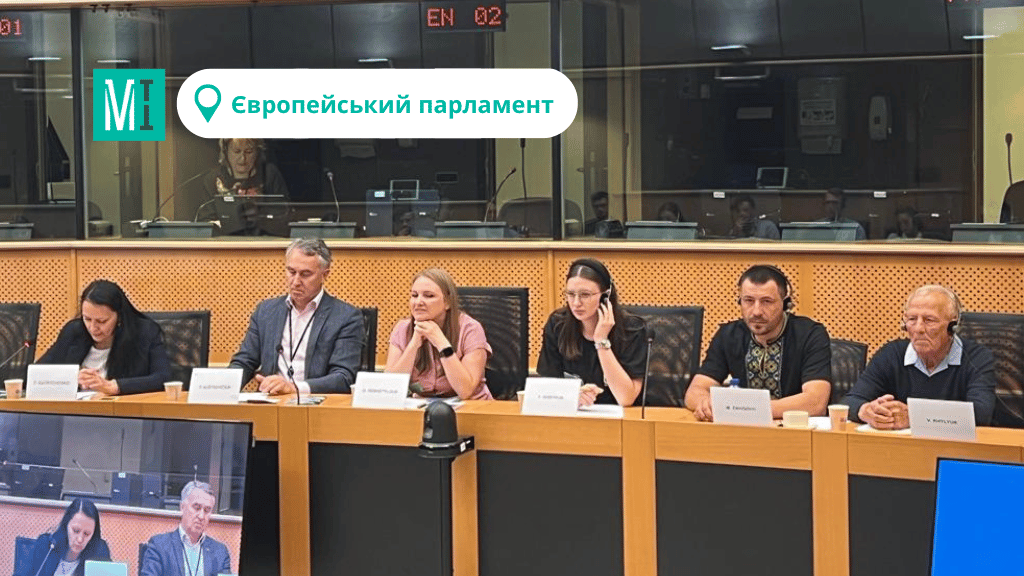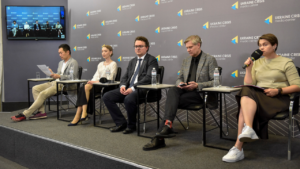“We must be honest: the instruments created after the Second World War are not working. We need new ones,” — Olha Reshetylova at the European Parliament

On July 6, the European Parliament hosted a special event dedicated to the issue of releasing civilian hostages illegally abducted and held captive by Russia. The event, initiated by MEP Petras Auštrevičius, occurred as part of the MIHR advocacy trip to Brussels.
MIHR coordinators Olha Reshetylova and Tetiana Katrychenko provided an expert analysis of the situation, while relatives of the captives Yulia Khrypun and Vasyl Khylyuk and former civilian hostage Mykola Zakhozhyi shared their personal stories. During the event, the MIHR presented the mechanisms developed with the support of the Ukraine 5AM Coalition, which can help to gain access to civilians in Russian captivity and ultimately release them.
We thank Mr. Austrevicius and our partners, Front Line Defenders and International Partnership for Human Rights, for their support and the opportunity to address the international community.
As of June 2023, the Media Initiative for Human Rights and the working group of the Ukraine 5AM Coalition working group on enforced disappearances identified 1,170 civilians illegally detained by the Russians. This data was presented by the MIHR coordinator Tetiana Katrychenko during her speech at the European Parliament. According to her, the Russians continuously detain people in the occupied territories. After the beginning of the occupation of a region, these detentions can be chaotic — to replenish the so-called exchange fund, as well as targeted — citizens with an active pro-Ukrainian position, former military and those who, in the opinion of the Russian Federation, could have resisted the occupation are wanted. Katrychenko explained that the Russians consider disagreement with the occupation, unwillingness to cooperate, and statements supporting Ukraine’s unity to be resistance. Therefore, the number of detained civilians is constantly growing.
“The Russians may be detaining Ukrainian citizens right now as we speak. This may be happening in occupied Berdiansk, Melitopol, Kakhovka, Donetsk, Luhansk, Simferopol, and other cities and villages of Ukraine. Therefore, MIHR is constantly updating the lists of civilian hostages and monitoring their location.
These people are not just detained. They are beaten, tortured, and starved. We know of cases of civilian deaths in captivity,” — said Katrychenko.
She clarified that the practice of detaining civilians in the occupied territories began in 2014, when Russia first invaded Ukraine. Currently, civilian hostages are held in prisons, detention centers, and other places of detention in the temporarily occupied territory and in the Russian Federation itself. The MIHR knows at least 40 places where civilian hostages are being held in Russia.
“At present, the Russian side denies that it is holding civilian hostages, as such actions can be qualified as an international crime,” — Katrychenko said.

Vasyl Khyliuk, father of journalist Dmytro Khyliuk, who was abducted by Russians from his home during the occupation of Kyiv region, said that he hasn’t seen his son for a year and four months and has very little information about him. The only thing he managed to find out during this time: Dmytro was first held in the town of Novozybkiv in the Bryansk region, and recently the International Committee of the Red Cross reported that the journalist had been moved to the Vladimir region of Russia.
“Unfortunately, we don’t know anything about his health or the conditions of detention in this prison, and we can’t send him a letter because Russia is against it. Civilian hostages do not participate in prisoner exchanges. And now, in various prisons, the Russians hold thousands of Ukrainians, civilian hostages, whom Russia considers prisoners of war. My son, journalist Dmytro Khyliuk, became such a hostage.
I very much hope that Ukraine’s partners, European diplomats, and all European leaders will consider the issue of Ukrainian civilian hostages in a detailed and comprehensive manner to help Ukraine free these people from Russian colonies. Of course, everything we, the families, want is for our loved ones to return home. For the return of Dmytro Khyliuk, for whom his entire family has been waiting for a very long time,” — said Vasyl Khyliuk.
The story of the detention of her father, civilian hostage Serhii Khrypun, was told by his daughter Yulia Khrypun. The Russians abducted Serhii in Zaporizhzhia region on March 2022. Since then, there has been little information about him, and the girl doesn’t even know if her father is still alive.
“The only news we have from him is from military witnesses who were released through an exchange. The only letter we received from him was through the Red Cross. It contained a few words, and from the context, I understand that my father wrote it under the supervision of the Russian military. He wrote it directly from dictation. He addressed it to his mother, my grandmother. He wrote that they were treated well, fed, and provided with medical care. And the only phrase he added from himself: “The main thing is to wait and hope. Hello to everyone. I love you all.” The letter was written on May 26, 2022, and we received it in early September 2022, i.e., 4 months later. I know from witnesses that everything written in this letter about good treatment is untrue. I know that he was tortured and is being tortured now. That the torture was by electric shock. They sing the Russian anthem for six hours a day.
I would like to emphasize that these people, who were detained right at work or at home, were forcibly taken to the territory of Russia. I am asking you and the entire European community to help.
I think this is our common misfortune because I never thought that at the age of 21, the only thing I would dream of was seeing my father alive.
I am asking you to feel the pain of people who have been living in the dark for a year and a half, who do not know whether they will see their relatives at all,” — said Yulia Khrypun.

Mykola Zahozhyi, a former civilian hostage who was also abducted by the Russians last March, was able to return home in February 2023 as part of an exchange. Zakhozhyi, along with other civilian prisoners, was taken to the Kursk SIZO (Detention Center) No. 1 in mid-March last year. The man told the MEPs what civilian hostages in Russian prisons go through.
“It’s a tough moment in the Kursk detention center when the “reception” occurs. Russian guards of this detention center stand in two rows, and we have to run through this corridor. And while we were running, they beat us with tasers and truncheons. This all went on for several hours. We were taken to the shower, had our hair cut, and during all this, we were beaten, called names, and threatened. For the next few days, we were taken out of the cell individually, interrogated, and DNA was taken without our consent. This torture continued every day. On April 6, we were put on a plane again and landed in Tula. There we experienced the same “reception” as in Kursk. But in Tula, it was more brutal. There were more beatings: when we went to the shower, outside, for that short walk that they took us out.
One day, a guard came to us, handed out some sheets of paper, and told us to write that we were being fed and treated here and that we were happy with everything. I wrote my letter in the middle of the summer, but it never got to my family. My wife learned that I was alive from a prisoner who was released from Kursk. He was in the cell with me. Before that, they had no news. Everyone thought I was dead. They went to the identification and saw many bodies, but I was alive.
There are a lot of people like me there. There were 14 of them in my cell alone, all with very similar stories. The conditions there are very hard.
We are ordered to stand all day, and we can sit down only when we eat. That is, only three times a day. While there, I lost a third of my weight, about 25—27 kilograms. I constantly believed and did not lose hope that I would return home. And on the night of February 1, the door opened, my name was called, and I was exchanged as a soldier,” — said Mykola Zahozhyi.

According to Olha Reshetylova, MIHR coordinator, there is currently no mechanism for releasing civilians from captivity. After all, the capture of civilians is illegal. The Media Initiative for Human Rights has been developing such mechanisms for several years. The recommendations apply to both Ukraine and the international community.
“Ukraine will not be able to cope with this situation alone. We need foreign support to force the Russians to release civilian hostages without any conditions. It is also necessary to demand access to the places where civilian hostages are being held. Unfortunately, the International Committee of the Red Cross cannot help in this situation. We see examples of letters from prisoners. These letters, which were delivered by the Red Cross, were not written by civilian hostages in their presence. The ICRC acted only as a courier. The Red Cross did not even see the people who wrote these letters.
So we must be honest: the instruments created after the Second World War are not working. We need new ones.
The situation with civilian hostages has been going on for over 9 years since the first Russian invasion. These people have been imprisoned for years, and no one can help them,” emphasized Olha Reshetylova.
Polish MEP Włodzimierz Cimoszewicz emphasized: “Everything Russia is doing in Ukraine is illegal. This is a violation of international law: aggression is illegal, killing people is illegal, forced deportations of people from the occupied territories are illegal, and killings of thousands of Ukrainian children are also illegal. The majority in the European Parliament supports Ukraine. But I’m afraid that European diplomacy can have minimal impact on Russia because we have almost no relations with Russia today. But we can find someone who will try to do it.”
Cimoszewicz also added that Ukraine now has to register every case of enforced disappearance of civilians. Especially when it comes to children: “Because adults who have been absolutely illegally detained still know who they are and where their home is. But children, who are now four, five or six years old, they may forget and may not know who they are”.








